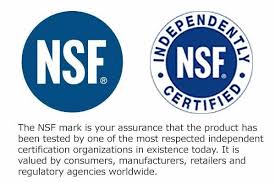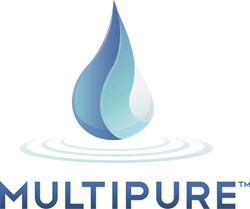You have no items in your shopping cart.
Related: Why NSF Certification is so important
Speaking of that wise crack about "if you're not using a water filter, you are the filter," have you ever wondered what the difference is between a good water filter and a bad one?
I mean, there are dozens and dozens of products available to choose from (water filtration systems obviously), and they all look the same to the "untrained eye," while claiming to do this and that; they're ready and willing to provide you, the happy customer, with water purer than unicorn tears.

However, in the real world, and by real world I mean "scientifically tested and proven for claims" world, not all water filters are created equal, not by a long shot.
The problem with water filters is that anyone can build and sell one, because there are no federal regulations with regard to residential water purifiers, also known as water filtering systems. The problem with the free market is that companies are trying to sell their products, and while they're at it, some tend to exaggerate the qualities of their merchandise, or, to put it in another way, they make extraordinary claims without providing extraordinary evidence.
The thing is, if you don't have an independent third party to verify the veracity of a company's claims regarding their latest and greatest water purifier, something along the lines of a science-lab funded by the "feral gummint" using taxpayers money to test each and every product as soon as it hits the market (or in advance), you as an average Joe Sixpack shopping for a quality water filter have no way of determining if a water filter really is as good as its manufacturers claims it to be, or better than, say, another water filter with similar claims.
But don't worry, the free market's invisible hand never sleeps (pun intended), hence independent organizations are here to save the day. I am talking about NSF International. NSF ( National Sanitation Foundation International) is a fancy sounding and independent (also private) organization that tests and henceforth certifies water filtering systems and components (like replacement filter cartridges).

Basically, a water filter that boasts NSF certification somewhere on its tech-specs sheet is guaranteed to remove specific contaminants as per NSF's standardized level. "So what," you may argue, "what if those guys are bought and paid for by George Soros who tries to poison our drinking water and turn the frogs gay?" (If you're not getting the Alex Jones reference, you're behind on internet culture)
Getting back to NSF, this is a very respectable non-profit organization founded way back in 1944, and its charter is all about protecting both the environment and public safety alike. Since we live "in the current year" to quote Mr. Trudeau, today's NSF is a global leading authority which provides 3rd party certification and testing for water filters (among many other things), basically forcing the industry to abide to certain standards and to demonstrate the quality, reliability and performance of their products.
NSF is also boasting ANSI accreditation, and if you're asking me what on Earth is ANSI, well, go read for yourself. All you need to know is that the NSF Certification Program for Point-Of-Use (POU) and Point-Of-Entry (POE) systems and components dates way back to the 70s and the first NSF standard (DWTU) was adopted in 1973.
Nowadays, a water filter with NSF certification will guarantee you, as the customer, a structurally solid product, built using safe materials and components (as in BPA free), which doesn't lie about its performance. And speaking of performance, yes, you can determine a good water filter based on its NSF certifications. In our case, 42, 53 and 401 are the most important. Why? Well, a water filtration system, whether is point-of-use (under the sink, water pitcher, etc.) or point-of-entry (whole house) system, must provide you with clean and good tasting/odorless water at the minimum.
Here's where the NSF Standard 42 standard comes into play, as it certifies a product capable of reducing aesthetic impurities ( such as taste, odor, chlorine). Some of the best NSF 42 certified water filters are the Multipure Aquadome or the Multipure Aquaversa depending on one's preference (the latter's more versatile, i.e. it can be installed in-line, under the sink or as a countertop unit).
The NSF Standard 53 standard guarantees that a water filter meets (ours exceeds) minimum safety requirements with regard to reducing water contaminants harmful to human health, including lead, VOCs (Volatile Organic Compounds), MTBE (Methyl Tertiary Butyl Ether), along with bio-hazards such as Cryptosporidium and Giardia. Basically, NSF 53 is all about minimizing exposure to chemical, microbiological and/or particulate contaminants, which are hazardous to human health. Moreover, this standard guarantees a water filter's material safety, structural integrity and its contaminate reduction performance claims, and it's a must-have certification for water filter systems using Solid Carbon Block technology, such as Multipure's state of the art Multipure Aquaperform. Yes, this baby will cost you half a grand, but if you want the best for your family, and you live in an area where your tap water is contaminated with Arsenic V, you can't really afford not to get it.
Finally, there's the NSF Standard 401, which certifies a water filter capable of reducing up to 15 separate contaminants from your tap water, including herbicides and pesticides, BPA and pharmaceuticals. This standard is met in all of the Multipure systems we sell including the Multipure Aqualuxe. This top-of-the-line system comes with all the bells and whistles one can expect from a high-end gizmo, boasting unparalleled performance and features, including the NSF-certified ability to remove bacteria and virus (NSF Standard P231).
Before you ask, let me close with a statement that should take a big load off your mind: yes, all Multipure water filtration systems are certified to meet and exceed NSF's 42, 53, and 401 standards (and in the case of the Aqualuxe, Standard P231), unlike other (some famous) brands who claim that getting NSF certification is too complicated and time consuming, and all that nonsense. If you're looking for a high quality water filtration system from an industry leading manufacturer who recognizes the importance of standard compliance, look no further than Multipure.









← Older Post Newer Post →
0 comments